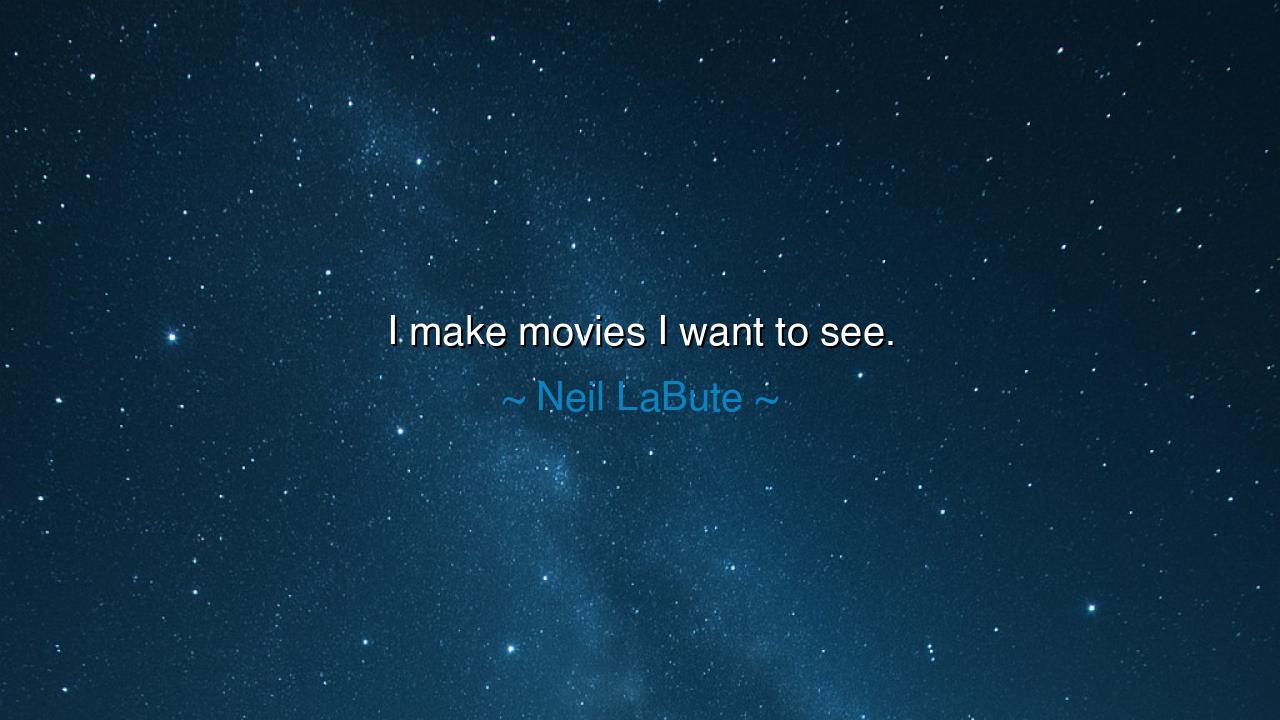
I make movies I want to see.






When Neil LaBute declared, “I make movies I want to see,” he spoke the creed of the true artist. His words are simple in form, yet profound in meaning, for they capture the eternal struggle between authentic creation and the demands of an audience. LaBute’s statement is a declaration of independence, a refusal to become a servant to trends or the fleeting appetites of the crowd. In saying this, he claims the right of the artist to create not for approval, but for truth—truth to his own vision, his own hunger, his own soul.
The origin of such a conviction lies deep in the history of art. From the beginning, those who created with lasting power were not those who merely copied the fashions of their age, but those who brought forth what burned within them. Michelangelo carved the stone not to please patrons, but to release the figures he claimed already lived inside the marble. Beethoven wrote symphonies not for comfort, but because music thundered within him like a storm. Likewise, LaBute, in choosing to make movies he wants to see, follows in this lineage of creators who serve the flame of their own vision above all else.
Consider the story of Vincent van Gogh. In his lifetime, he sold almost nothing, and his work was ridiculed or dismissed. Yet he painted with passion, not because others demanded it, but because he was compelled by his own inner vision. He painted what he wanted to see—the light, the fields, the faces as he perceived them. Though the world turned away, he pressed on, leaving behind a legacy that would one day shake the art world to its core. His story is proof of LaBute’s teaching: authentic creation often precedes recognition.
The meaning of the quote is not selfishness, but courage. To make movies—or to write books, paint pictures, or compose music—that one personally wishes to see is to embrace vulnerability. It means trusting that one’s private vision, if pursued with honesty and depth, will resonate with others who share that hunger, even if they do not yet know it. It is easier to chase applause, but it is nobler to chase truth. LaBute’s words remind us that the artist is not merely an entertainer but a seer, a translator of what lies within into something others may behold.
The lesson for us is clear: in all acts of creation, whether in art or in life, do not abandon your vision for the comfort of the crowd. What matters most is not whether your work pleases everyone, but whether it is true to your heart. The world may reject, misunderstand, or mock—but truth endures. If you create only for others, you become their servant. If you create for yourself, you stand as an equal before creation, and in that honesty lies greatness.
What, then, should you do? First, seek within yourself the vision of what you wish to see, hear, or bring into being. Second, commit to creating from that inner fire, even if it seems strange or unpopular. Third, trust that authenticity will, in time, find its audience, for sincerity carries a power that imitation never can. And finally, remember that what is born of truth may inspire others far beyond what you can see in the moment.
Thus, let LaBute’s words stand as a torch for all creators: “I make movies I want to see.” Do not live by the dictates of fleeting applause, but by the eternal call of your own soul. For when you create what you long to behold, you honor not only yourself, but the human spirit itself. And in that act of courage, you join the ancient company of all who, through truth, gave the world its most enduring treasures.






AAdministratorAdministrator
Welcome, honored guests. Please leave a comment, we will respond soon